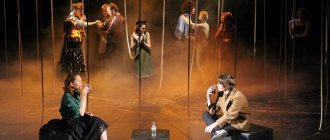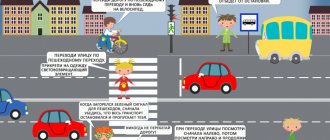Your psychologist. The work of a psychologist at school.
Objectives: to convince students of the need to politely address people around them; cause condemnation of bad manners, rudeness; form the habit of polite behavior in basic communication situations. Preparatory work: children are preparing to recite poems about polite words by heart Equipment: poster “Nothing is as cheap or valued as much as politeness. Cervantes"Plan
1. Introduction 2. Work on the concept of “politeness” 3. Exercise “Politeness in Belarusian” 4. Discussion of proverbs and aphorisms 5. Group work on drawing up rules of politeness 6. Game exercises (playing out situations) 7. Generalization
Progress of the conversation
1. Introduction Children read poetry: Good afternoon! - they told you. Good afternoon - you answered. How two strings are connected - Warmth and kindness Hello! - you tell the person. Hello! - he will smile back. And he probably won’t go to the pharmacy and will be healthy for many years. Cancel, perhaps, the word “please”? We repeat it every minute. No, perhaps, that without “please” We become uncomfortable. Forgive me, I won’t accidentally break dishes or interrupt adults anymore. But if I do forget, I’m sorry, I won’t do it again. - What are the names of the words that were spoken just now? What other polite words do you know? Why are they called magical?
Working on the concept of “politeness”
-What does this word mean? (“Vezha” comes from the word “to know,” that is, to know. Vezha used to be called people who know a lot. Politeness today is a quality that is manifested in the ability to follow the rules of communication when you greet adults and peers when meeting them, make a request , thank you, congratulate you on the holiday, etc.) - What do you call a person who always says polite words? - What will they say about someone who is not used to speaking polite words? - Why do you have to be polite?
Exercise “Politeness in Belarusian”
- Listen to how pleasant polite words sound in Belarusian: Dzyakuy, na zdarouya, vyalsh dzyakuy, daruytse, kal laska, vybachaytse, ne kryudzyuya na myan, pryvganne, dobraga zdarouya, glad bachyts, yes pabachennya, dabranach, usyaho dobraga, yes sustrechy , yes spatkannya, prabachtse, I’m ignorant, usyago nailepshaga, shcha^va, no good luck, good ranches, I’m hiding you, prabachtse, what’s wrong. - Choose any polite word or phrase, describe a situation in which it can be used and pronounce this word with the correct intonation.
Discussion of proverbs and aphorisms
— How do you understand the words of the Spanish writer Cervantes “Nothing is so cheap and is valued so dearly as politeness”? - Explain the meaning of the proverbs: From one word, a quarrel forever A razor scrapes, but the word wounds An affectionate word is like spring day The word heals, the word also wounds Don’t be afraid of the knife - the tongue.
Group work on drawing up rules of politeness (you can use the “add the rule” technique; it is useful to set up a stand “Simple rules of politeness” in the class).
Its content may be like this. - When meeting friends... smile, sincerely say hello, calling the person by name or first name and patronymic. - If you ask for something... say “please”, “excuse me, could you help me”, “would you be so kind”. - Don’t forget to thank for your help, speak up. (“thank you very much”, “thank you”). - When leaving, politely say goodbye, say goodbye. (“goodbye”, “all the best to you”, “see you later”). - Be polite to your classmates,... don’t give them nicknames or nicknames, always call them by their first names, don’t raise your voice, don’t be rude. - During a conversation, be able to listen to others... do not be hot-tempered, irritable; Don’t respond to rudeness with rudeness, be restrained. - Show politeness in communicating not only with your loved ones, with your teacher, but also... with neighbors, classmates and even strangers. - You should greet your elders... first, but you should never be the first to shake hands. - Behave in such a way... that others feel pleasant and comfortable with you. -When addressing an adult, use the word “you”, because... this is how it is customary to speak with elders, by doing this you express respect for them; - When addressing a question or request to an adult,... say: “Let me ask...”, “Please tell me...”, “Please tell...”, “Excuse me, would you say...”.
Game exercises (playing out situations):
-your mother sent you to your neighbor to ask for a loan of some citric acid -a stranger asks you how to get to the nearest pharmacy -you want to invite your friends to your birthday party -you decided to go to your friend’s house, but your mother doesn’t know about it -you you want to ask a teacher who is currently busy about something - you give up your seat on public transport - you met a classmate on the street - your friend talks to you rudely - you accidentally pushed a friend, etc.
Generalization
- Is it difficult to be polite? - Why is politeness so highly valued? - How to become polite? Reading a poem by V. Kudlachev Give the words “goodbye”, “thank you”, “forgive me”, “please”, “hello” generously to your friends and acquaintances On the trolleybus, in the park, And at school, and at home, Always and everywhere. These simple words are very important, a person needs them like air. It is impossible to live in the world without them. These words must be given with a smile!
To be polite and attentive to people, you need to learn to recognize a person’s state and mood by his appearance. First of all, learn to recognize the mood in the eyes of those closest to you - mom, dad, grandfather, grandmother, brothers and sisters. It is important to see, hear, understand another person, respect him, regardless of whether he is familiar to you or not. It is difficult and not difficult. It’s difficult if you don’t understand why you need to take other people into account and don’t want to understand their condition. It’s easy if you think that although you are not yet an adult, you can already alleviate the grief or trouble of another person, rejoice in other people’s joys. All you need to do is say a polite word on time and with all your heart, and show respect. It is so simple. Try it! And you will see that it is not for nothing that polite words are called magic. Additional material V. Lunin I love it when, when we meet friends and family: Good morning! Good evening! Good night! - we say And life seems to be better And your heart is happier, If you wish others well-being on earth. G. Oster If you come to visit friends, do not greet anyone. Don’t say the words “please” or “thank you” to anyone. Turn away and don’t answer anyone’s questions. And then no one will say about you that you are a talker. We all once learned to walk, draw, talk. Let's remember, guys, how to be kind and polite. When I meet friends and acquaintances, I look into their eyes with a smile. It’s very easy for me to be polite, and I’ll be the first to say “hello.” It was beautifully invented by someone - To thank for your help, The usual word “thank you” We must not forget to say. When we say goodbye, we all say “goodbye.” We always say to each other, “Please,” if we want to fulfill a wish or a request. There are so many useful, beautiful and affectionate words in the world. Please, just be polite, Because this is the basis of the basics. Riddles about politeness It’s not too lazy to tell your friends, Smiling: ... “Good afternoon” To each other in parting We will say:. "Goodbye". You shouldn’t blame a friend for being offended, it’s better to do it sooner. sorry. How beautiful it is, the kind word “thank you.” How similar the word “reign” is to the friendly “hello.” When you are guilty, hurry to say: “I beg you, please.” I'm sorry." Never get involved in someone else's conversation, and you better not interrupt adults. You can say hello not only by saying “Hello!”, but also by movements and gestures. Since ancient times, when meeting, some bowed from the waist, others bared their heads, fell to their knees and hit the ground with their foreheads (beat them with their foreheads), others raised their hands to their foreheads and hearts, and others touched their noses. In the old days, the officers of the royal guards clicked their heels loudly and dropped their heads, as if cut short, onto their chests. The ladies of high society curtsied deeply. The knights raised the visors of their heavy helmets and pulled off their hand gloves. In the classroom, it is advisable to design a poster “Let's be polite”: Words of greeting: hello, hello, good morning, greetings, glad to see how you are, long time no see. Words expressing a request: please, I ask you, be kind, be so kind, could you..., would it not be difficult for you, can I make a request to you. Words of apology: I'm sorry, I'm sorry, I beg your pardon, I'm very sorry, I'm sorry, I accidentally, I'm to blame, I'm sorry Words of farewell: See you, goodbye, all the best, farewell, I wish you all the best, stay happy, all the best to you. Words of gratitude: thank you, thank you very much, thank you, very grateful to you. Source: L.I. Baranova Extracurricular activities to educate the moral culture of junior schoolchildren
Summary of a lesson on speech development for the senior group “Polite words”
Elena Vradiy
Summary of a lesson on speech development for the senior group “Polite words”
Summary of a lesson on speech development in the senior group
"Learning to be polite "
Goals and objectives: tell children about some important rules of behavior in a team, the need to comply with them; to form in children the habit of following generally accepted rules of politeness , to teach children a culture of communication, to activate the appropriate words and phrases speech .
Summary of an ethical conversation in the preparatory group “Polite words and actions”
Summary of ethical conversation in the preparatory group
"Polite words and actions"
Integration of educational areas:
“Cognitive development”, “Social and communicative”, “Speech development”, “Physical development”
“Speech development”:
— Learn to emotionally and actively participate in dialogues
— Develop skills in using polite words and expressions in speech, teach children the correct construction of sentences
“Social and communicative development”:
— Cultivate moral qualities: politeness, respect for elders
— To develop the ability to reasonably evaluate one’s actions and the actions of other people
«Cognitive development":
— To consolidate children’s knowledge about politeness, about polite people, knowledge of proverbs and sayings about politeness
"Physical development""
— Promote the development of children’s motor activity: coordination of movements, coordination of actions, dexterity
Preliminary work:
creation of special situations requiring polite treatment. Stories from a teacher from his childhood “How I learned politeness as a little girl.” Observing the relationships between children in games, everyday life, reading works with an aesthetic basis.
Progress of the lesson:
1 part
Host: Guys, think and tell me, who can we call a polite person? (children's answers)
Host: That's right, a polite person does not cause trouble or offense to another. A polite person always says hello and goodbye, is friendly and attentive. If they ask him about something or ask him to provide some kind of service (bring something, help, etc.), he always does it willingly.
Guys, imagine that you live in a world where no one ever says: “sorry”, “excuse me”, “Please”. What do you think would happen? Why do we need such words? (children's answers)
Now tell me what polite words you know? (children's answers).
Host: If someone does something for you, you should say “thank you.” If someone says “thank you” to you, then you should say “you’re welcome”. And if you accidentally pushed someone, you should say “please excuse me.”
part 2
Host: To make sure you really understand everything, let's play a game. The game is that you will chorus to insert polite words into my story.
“One day Vova went to the theater. On the tram, he sat near the window and looked at the streets with interest, suddenly a woman with a little boy entered the tram, Vova stood up and said to the woman: “sit down” (the children chorused “please”). The woman politely thanked the boy Vova (the children said “thank you” in chorus). Suddenly the tram stopped, Vova immediately fell and pushed a man hard. The man got angry with the boy, and Vova immediately said (the children chorused “please excuse me”).
Well done! Did a good job.
Part 3.
Host: Guys, have any of you ever interfered in other people's conversations? Were they upset? Were they happy? (children's answers)
Host: When can you intervene in the conversation?
Children: Only if it is important and urgent.
Host: When should you not interrupt a conversation, no matter how important it is for you to resolve some issue?
Children: When people don't want to be interrupted or when they are very upset.
Host: Who guys will tell us how you can politely intervene in a conversation between two children or adults?
Children: Stand so that they can see you, wait for an answer. If the answer is no, accept it and leave. If the answer is yes, say thank you and quickly state the reason why you are intervening in the conversation.
Host: Now let's practice (play out cases, prepare children in advance).
Part 4
Host: Close your eyes and imagine a world where everyone shares with each other. There are no hungry or homeless people, everyone has housing. Imagine a world where no one jostles, tries to grab something or jumps in line. Where all people are kind to each other and polite.
Open your eyes, how did you like the world you just visited? What do you think? Would you like to live in such a world? (children's answers)
Host: And it is quite possible to have a world similar to this one. When we all learn to live well, in peace, to be kind, polite, to help each other, all this will be possible.
Now let's have a little fun and try to do what we talked about.
Part 5
Host: Let's play the game "Musical Knees." (Children stand in a circle, holding onto the waist of the person in front. When the music starts, they begin to move in a circle. When the music stops, each child must sit on their knees and not fall.) 2-3 times
Presenter: Well done! No one let anyone down, no one fell. Now let’s learn how to compliment each other. It’s very nice when someone says nice things about you, you want to become even better and kinder so that no one is offended. I wrote your names on pieces of paper, whose name you draw out and we will say compliments: “You have beautiful hair!”, “You have a beautiful dress!”, “Olya is very kind, she treats me with sweets,” etc.
Part 6
Host: And we completed this task. Egor Sasha, Masha and Christina said a lot of good and kind words about the children.
Well, now you and I will all become journalists and learn how to interview our comrades. An interview is when questions are asked, and someone answers them (pulls out a piece of paper with the name again). The child comes out, and the others ask questions. You can ask your friend: “What do you like to eat?” What's your favorite toy? What games do you like to play? Do you help your mother at home? At the same time, do not forget to say “tell me please” (children’s questions).
Presenter: Well done children! In the next lesson, we will also learn how to compliment each other and conduct interviews.
Result:
What did we talk about today? (children's answers).
Conversation in the senior group on the topic “Polite words”
Lyudmila Pushkina
Conversation in the senior group on the topic “Polite words”
Conversation in the senior group on the topic : “ Polite words ”
Conducted in MADOU D/S9 group No. 3 “Ivushka”
Integration of educational areas: “Communication”
,
“Reading fiction”
,
“Socialization”
Purpose: To systematize and consolidate children’s knowledge of moral education.
Educational: To form an idea of an educated person.
Developmental: Develop attention, memory, logical thinking, observation, coherent speech.
Educational: Cultivate a desire politely with people.
Demonstration material: Toy Parsley, ball.
Methodological techniques: conversation - dialogue , reading a poem, game situation, physical education, summing up.




